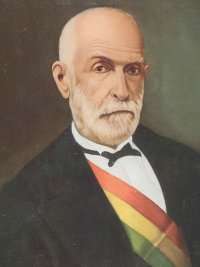Tomás Frías Ametller
| Tomás Frías | |
|---|---|
 | |
| 20th President of Bolivia | |
|
In office 28 November 1872 – 7 May 1873 | |
| Preceded by | Agustín Morales |
| Succeeded by | Adolfo Ballivián |
| 22nd President of Bolivia | |
|
In office 31 January 1874 – 4 May 1876 | |
| Preceded by | Adolfo Ballivián |
| Succeeded by | Hilarión Daza |
| Personal details | |
| Born |
21 December 1804 Potosí, Bolivia |
| Died |
10 May 1884 (aged 79) Florence, Italy |
| Nationality | Bolivian |
| Political party | Liberal Party |
Tomás Frías Ametller (21 December 1804 – 10 May 1884) was a Bolivian politician who served twice as president of Bolivia (1872–73 and 1874–76). Tomás Frías Province and Tomás Frías Autonomous University are named after him.
Tomás Frías was born to a wealthy land-owning family in Potosí. Frías was Minister of Foreign Relations of President José Ballivián (1841-1847) and a steadfast supporter of civilian rule and the primacy of laws. He was named President by Congress upon the death of dictator Agustín Morales in November 1872. His task was to call free elections as soon as possible. He did so, and in May 1873 transferred power to the winning candidate, Adolfo Ballivián, the son of the former President and war hero, José Ballivián. Unfortunately, Adolfo Ballivián soon fell ill with cancer and died in February 1874, after only nine months in office. At that point, Tomás Frías became President again by virtue of his being head of the Council of State, in accordance to the Constitution then in effect. As Ballivián's legal successor, his term in office was projected to run until 1877.
In 1874, the elderly president signed with Chile a treaty that freed all Chilean citizens and companies from any taxes for the exploitation of Bolivian resources in the Pacific coast. A reciprocal agreement liberated Bolivian concerns of similar taxes in Chile, but in reality the Chilean investment in the Bolivian Litoral was extensive while Bolivia's economic presence in Chile was negligible. For this reason, it is considered to be an agreement contrary to Bolivian interests. Its annulment by the successor government proved to be the touchstone of the disastrous War of the Pacific.
Despite the almost universal respect for the Frías government, this was still the era of the caudillos, and of military adventurism in politics. The president was overthrown in an 1876 coup led by General Hilarión Daza, and soon left the country. He died in Florence, Italy, in 1884.
References
| Political offices | ||
|---|---|---|
| Preceded by Agustín Morales |
President of Bolivia 1872–1873 |
Succeeded by Adolfo Ballivián |
| Preceded by Adolfo Ballivián |
President of Bolivia 1874–1876 |
Succeeded by Hilarión Daza |